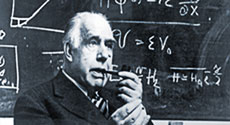Niels Bohr Lecture by Thomas Hertog
On the Origin of Time
Abstract: Perhaps the biggest question Stephen Hawking tried to answer in his extraordinary career was how the universe could have created conditions so perfectly hospitable to life. Pondering this mystery led him to study the big bang origin, but his early work ran into a crisis when the math predicted many big bangs producing many universes, most far too bizarre to harbor life.
Holed up in theoretical physics departments across the globe, Hawking and I worked shoulder to shoulder for twenty years, to develop a fresh vision of the universe’s birth that could account for its mysterious biophilic design. At the heart of our cosmogony lies a novel quantum framework for early universe cosmology that predicts that time and indeed physics itself fade away back into the big bang, leading to a Darwinian-like perspective on cosmogenesis.
In this colloquium I recount our quest to get a grips on the origin of time, and the bold new take on some of the universe’s fundamentals we have been led to.
Short Bio: Thomas Hertog is a theoretical cosmologist who was for many years a close collaborator of Stephen Hawking. He received his doctorate from the University of Cambridge and is currently professor at the Institute for Theoretical Physics of the KU Leuven.
In his research Hertog strives to better understand the nature of spacetime and the life cycles of black holes and the universe as a whole. As part of his ERC project, Hertog developed a novel holographic framework for early universe cosmology. He also brought together a multidisciplinary team that spearheaded Belgium’s involvement in gravitational-wave projects such as ESA’s LISA mission and the Einstein Telescope project.
Hertog is an acclaimed science communicator. He has curated several art-science exhibitions and is the author of On the Origin of Time, a monograph in which he has advanced a fundamentally evolutionary conception of physics borne out by the theory of the universe’s birth he developed with Stephen Hawking.
Coffee, tea and cake will be served outside Aud. 3 at 15:45
 Niels Bohr Lectures er en engelsk-sproget foredragsrække på Niels Bohr Institutet med kendte forskere fra hele verden.
Niels Bohr Lectures er en engelsk-sproget foredragsrække på Niels Bohr Institutet med kendte forskere fra hele verden.
Foredragene holdes cirka 10 gange om året og er offentlige. De er for studerende og ansatte ved Niels Bohr Institutet samt andre med interesse for at høre om videnskabelig forskning i verdensklasse. Foredragene holdes på et ikke-teknisk niveau, hvor de kan forstås af alle med en baggrundsviden, der svarer til de første år på fysikstudiet.
Tidspunkt og sted: Hvis intet andet er anført, finder foredragene sted kl. 15.15 i Margrethe Bohr Salen, Niels Bohr Bygningen, 2200 København N. Kaffe og kage serveres en halv time inden foredraget starter.
The lectures are public and held about 10 times a year. The lectures are for students and staff at the Niels Bohr Institute and others interested in worldwide scientific research. The lectures are held on a non-technical level where they can be understood by anyone with a background similar to the first year of physics study.
Time and place: Unless otherwise specified, the lectures take place at. 15.15 in Margrethe Bohr Salen, Niels Bohr Bygningen, 2200 Copenhagen N. Coffee and cake will be served half an hour before the lecture starts.
